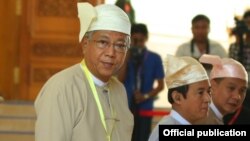Burma’s Union Parliament has elected Htin Kyaw, of the National League for Democracy, as the country’s first truly civilian president in more than fifty years.
“The presidential election is another important step forward in Burma’s democratic transition,” noted U.S. Secretary of State John Kerry in a message of congratulations.
Htin Kyaw is close advisor to National League for Democracy leader and former political prisoner Aung San Suu Kyi. He has worked with her to support Burma’s democracy movement since 1992.
“We commend the people and institutions of Burma who continue to work together to ensure a peaceful transfer of power after the November 2015 elections,” said Secretary Kerry.
November’s elections were another step forward in Burma’s historic democratic transition and the culmination of a reform process that started in 2011 with the relaxation of press and internet censorship laws; the release of political prisoners, including Aung San Suu Kyi; and efforts to improve the electoral process. The U.S. supported these reforms by easing sanctions previously levied due to human rights abuses by the country’s military junta. The U.S. also provided more than $18 million to assist the electoral process.
The National League for Democracy swept the November elections, winning 77 percent of seats in the Union Parliament and giving it the power to choose the president.
Reforms will, however, need to continue. The Burmese constitution reserves 25 percent of parliamentary seats and key cabinet posts for the military and allows them to name a vice president. State Department Spokesman John Kirby calls the allowance of unelected officials a “structural and systemic flaw,” noting that the people of Burma “should be allowed to vote for their leaders of their own choice.”
“The United States remains committed to supporting the people of Burma in their ongoing pursuit of democracy, development, and national reconciliation,” said Secretary Kerry. “We continue to encourage political and civil leaders to work together in the spirit of national unity and reform.”






